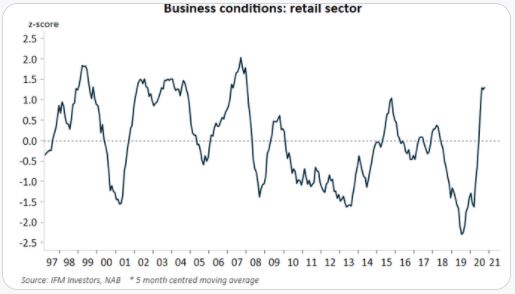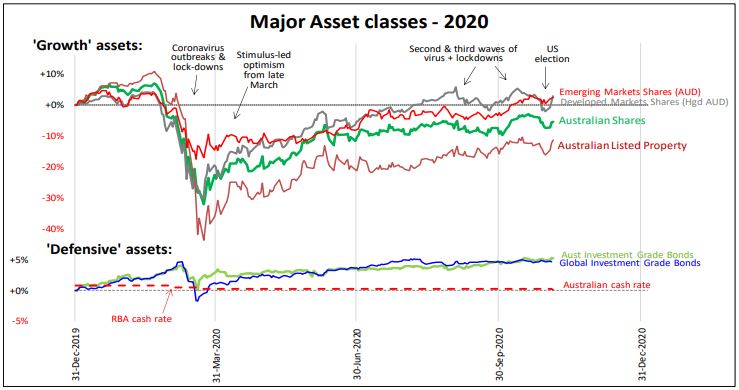Weekend market update: The S&P500 rose another 1.4% on Friday to close at a record high, and with NASDAQ adding 1%, confidence in the Pfizer vaccine pushed most global stock markets higher. Australia was up 3.5% for the week and Europe a heady 6.4%. The market is looking through the worsening virus numbers in the US, and there was the first hint from Donald Trump that he realises there will be no second term. On Friday, he said:
"Ideally, we won't go to a lockdown. I will not go, this administration will not be going to a lockdown. Hopefully the, the - uh - whatever happens in the future - who knows which administration it will be. I guess time will tell."
It really seemed as if he were about to say "Biden administration" but stopped himself and fell back on "who know which administation", but it looked like reality was dawning on him.
***
One of the downsides of Donald Trump commanding the headlines is that we overlook more significant issues. Many Australians now know more about how the US Electoral College system works and its magic 270 threshold than they do about our own Preferential Voting system. But more important, few people have read the coverage of the China Daily News this week where statements are terrifying Australian producers. It says:
"It is Canberra that has undermined what were previously sound and mutually beneficial ties by prejudicially fueling anti-China sentiment at home, baselessly sanctioning Chinese companies and aggressively sending warships to China's doorsteps ... Canberra should realize it will get nothing from Washington in return for its collusion in its schemes, while Australia will pay tremendously for its misjudgment." (my bold emphasis).
That's a bigger story for Australia than Trump, highlighted in our election update last weekend. The article goes on to quote Wang Wenbin, a spokesman for the Foreign Ministry, showing it is an official Chinese view. The article continues:
"With Australia mired in its worst recession in decades, it should steer clear of Washington's brinkmanship with China before it is too late.
To put it simply, if Canberra continues to go out of its way to be inimical to China, its choosing sides will be a decision Australia will come to regret as its economy will only suffer further pain as China will have no choice but to look elsewhere if the respect necessary for cooperation is not forthcoming."
Dennis Richardson, former ASIO Director-General, speaking at an event for the Minerals Council of Australia this week, warned:
"I think at the moment the Australia-China relationship has got caught up with domestic politics in Australia ... we are going to be in the dog house I think for a good two to three years."
The other side of the brinkmanship is that China needs Australian products, and its much easier to ban lobsters, wine and barley than it is iron ore. How the new US administration deals with China carries implications for Australian trade.
On a more optimistic note, amid a pandemic, high unemployment and lockdowns, Australia's recovery in retail business conditions is a welcome surprise. It is supported by massive government spending, but nonetheless, few expected the best retail conditions in over a decade any time soon.

CBA Economics reports an equally optimistic measure:
"Consumer sentiment: The Westpac/MI measure of consumer sentiment showed another solid rise of 2.6% in November after a very strong lift in October. The consumer sentiment index now sits at 107.7 and well above the 100 level that separates optimists from pessimists. A reading of 107.7 is also comfortably above the long run average of 99.2. Confidence around current conditions and expected conditions continued to lift in November."
Drawing on a chart from the CIO of Stanford Brown, Ashley Owen, shows the stock market recovery, although Australian shares and listed property remain well below their levels at the start of 2020.

In this week's articles ...
We dive into the success of Exchange Traded Funds (ETFs) with Alex Vynokur of BetaShares, and explore how they performed during the pandemic and what the future brings.
Then two articles on retirement spending. First is an interview by Michael Kitces with the originator of the '4% withdrawal rule', Bill Bengen. It has become a retirement planning standard but does it still work?
Josh Funder checks the three pillars of our retirement planning system with an emphasis of the role the family home can play in meeting spending needs. He suggests a '3%+1%' as a variation on Bengen.
And while on latter-life planning, Christine Benz provides an intriguing list of seven estate planning items you may have missed which can make life easier for the people left behind.
Investors continue to seek alternatives to the miserable rates on cash and term deposits, which is giving bonds and hybrids a boost. Jon Lechte from a new sponsor of Firstlinks, Bond income, gives examples of new bonds available to people who qualify as 'wholesale', plus a summary of three recent hybrid opportunities. See also the announcement of the first fund in a sister business, Fund income.
Gold has found a place in more portfolios than ever in 2020, and Jordan Eliseo describes the political impact of Democrat or Republican administrations, and why gold rose then fell during the election process.
The announcement by Pfizer of successful vaccine trial results gave the market a kick up, but regardless of its success, in a highly competitive field, Robert M. Almeida finds another way to make money from the pandemic theme.
This week's White Paper from Franklin Templeton studies our most precious resource, water, and how it affects economic policy, population growth, climate change and the day-to-day operation of companies.
Note also a wide range of updated reports on ETFs, LICs and listed investments generally in our Education Centre, linked below.
Graham Hand, Managing Editor
Latest updates
PDF version of Firstlinks Newsletter
Australian ETF Review for October 2020 from BetaShares
ETF Quarterly Report for September 2020 from Vanguard
ASX Listed Bond and Hybrid rate sheet from NAB/nabtrade
Monthly market update on listed bonds and hybrids for October from ASX
Indicative Listed Investment Company (LIC) NTA Report from Bell Potter
Monthly Investment Products update for October 2020 from ASX
Plus updates and announcements on the Sponsor Noticeboard on our website